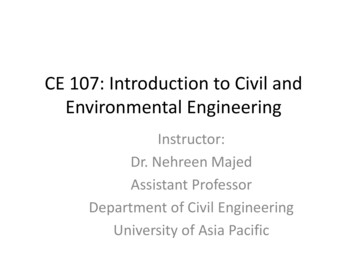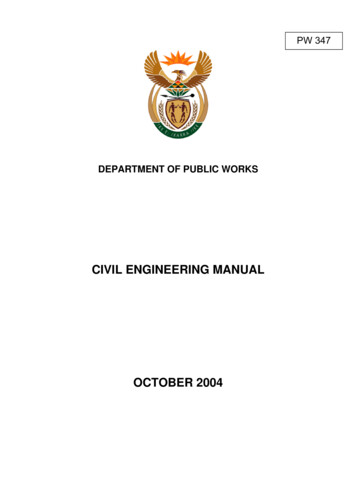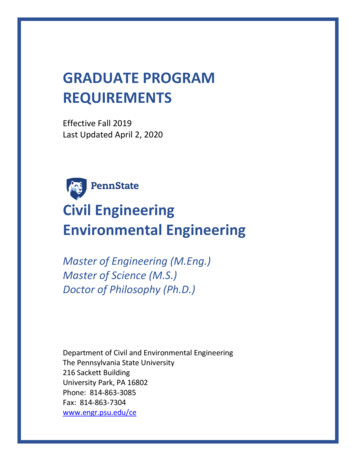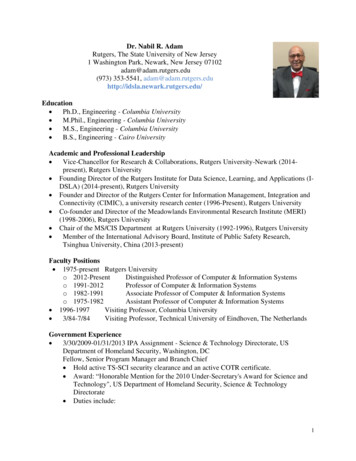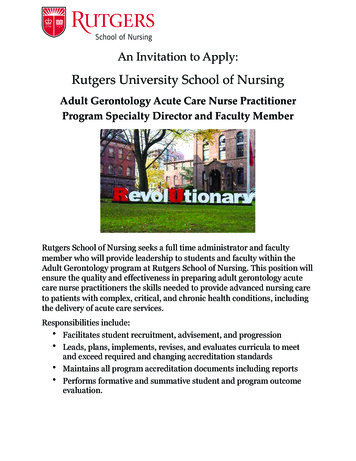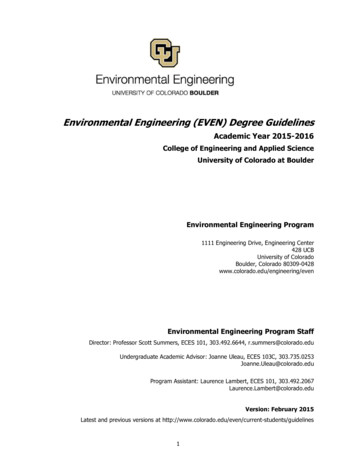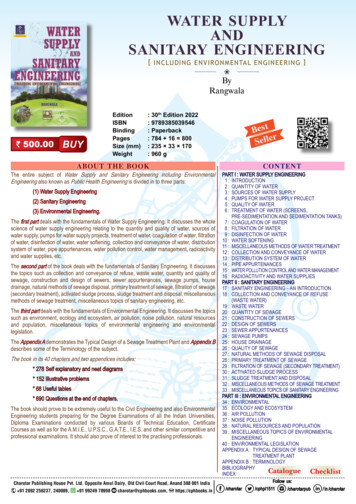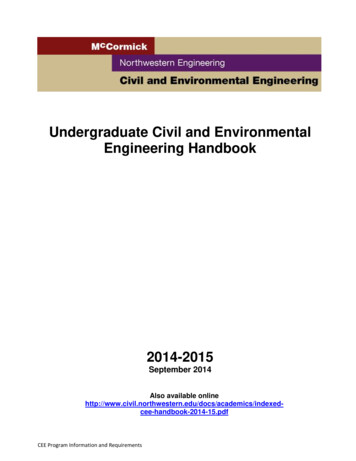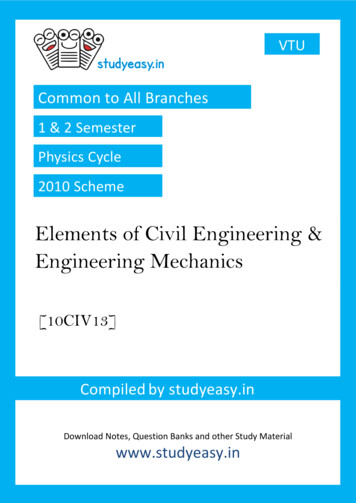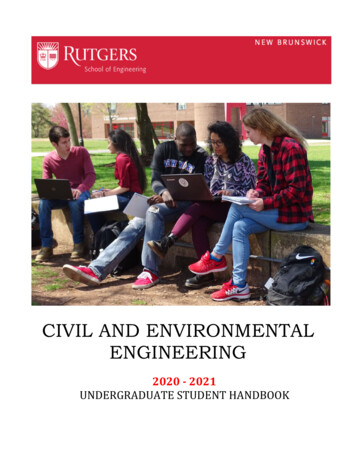
Transcription
CIVIL AND ENVIRONMENTALENGINEERING2020 ‐ 2021UNDERGRADUATE STUDENT HANDBOOK
TABLE OF CONTENTSINTRODUCTION . 3PROGRAM EDUCATIONAL OBJECTIVES . 3PROGRAM STUDENT OUTCOMES . 4PROGRAMS OF STUDY . 4GENERAL REGISTRATION RULES FOR ALL CLASSES . 7REQUEST FOR SPECIAL PERMISSION NUMBER (SPN) . 8REQUEST FOR PRE‐REQUISITE OVERRIDE . 9TAKING A COURSE AT ANOTHER SCHOOL . 10TRANSFERRING INTO THE SCHOOL OF ENGINEERING . 10UNDERGRADUATE FACULTY ADVISORS. 11CIVIL ENGINEERING CURRICULUM (CLASS 2019, 2020, AND 2021) . 12CIVIL ENGINEERING CURRICULUM (EFFECTIVE CLASS 2022) . 12CIVIL AND ENVIRONMENTAL ENGINEERING PRE‐REQUISITE CHART . 14FALL AND SPRING JUNIOR YEAR COURSE SCHEDULE . 15FALL AND SPRING SENIOR YEAR COURSE SCHEDULE . 16DEPARTMENTAL ELECTIVES . 17TECHNICAL ELECTIVES. 18SCIENCE ELECTIVES . 23SPECIAL PROBLEMS IN CIVIL OR ENVIRONMENTAL ENGINEERING . 24CO‐OP INTERNSHIP APPLICATION FORM . 25PROPOSAL FOR COOPERATIVE (CO‐OP) EDUCATION INTERNSHIP . 26DEPARTMENT OF CIVIL AND ENVIRONMENTAL ENGINEERING FACULTY . 27COURSES DESRIPTION (REQUIRED COURSES) . 31COURSE DESCRIPTION (DEPARTMENTAL ELECTIVES) . 33THE BS/MS FIVE (5) – YEAR PROGRAM . 35FE/EIT EXAM INFORMATION . 38STUDENT ORGANIZATIONS . 402
INTRODUCTIONThe Department of civil and environmental engineering offers a four‐year undergraduate curriculumleading to the Bachelor of Science degree, a professional degree. A dual‐degree program also is offeredleading to a B.S. degree in civil engineering and a B.S. or B.A. degree in any liberal arts and sciencemajor. There are two joint BS/Master’s programs available: a BS‐MS five‐year program and BS‐MBA fiveyear‐program. Details for these two joint BS/Master’s programs are available ms. A Co‐op Program is available for students who areinterested in obtaining practical experience before graduation with engineering firms and governmentagencies.This handbook is intended to inform and update the undergraduate civil and environmental engineeringstudents regarding academic policies, procedures and requirements that are particular to civil andenvironmental engineering students. This handbook also is intended to provide faculty advisors withcodified information necessary for student advising and counseling.All faculty advisors and civil engineering students should carefully read this Student Handbook as well asthe University Academic Policies and Procedures and Degree Requirements posted on this linkhttps://soe.rutgers.edu/oas/academicpolicies and published in the current New BrunswickUndergraduate Catalog located on the web at http://catalogs.rutgers.edu/generated/nb‐ug current/.It is the responsibility of the student to be familiar and be cognizant of this student handbook andUniversity Policies and Procedures.PROGRAM EDUCATIONAL OBJECTIVESConsistent with the stated mission of the University, the objectives of the civil engineering program areto provide students with a broad and thorough education in civil and environmental engineeringfundamentals, applications, and design. The education will prepare graduates for the practice of civiland environmental engineering at the professional level with confidence and skills necessary to meetthe technical and social challenges of the future and for continuing their studies at the graduate level. Inparticular:1. Graduates will experience successful careers in the civil engineering profession that incorporateslife‐long learning leading to professional licensure and/or advanced degrees.2. Graduates will communicate effectively in oral, visual, and written means and have professionaland ethical responsibility in the practice of civil engineering.3. Graduates will demonstrate a record of individual and team accomplishments in developingcreative and sound engineering solutions to practical problems that meet professional, societal,sustainability, and global challenges.3
PROGRAM STUDENT OUTCOMESAttainment of student outcomes prepares graduates to enter the professional practice of civilengineering. Each student in the civil engineering program is expected to demonstrate the followingoutcomes by the time of graduation:1) an ability to identify, formulate, and solve complex engineering problems by applying principlesof engineering, science, and mathematics.2) an ability to apply engineering design to produce solutions that meet specified needs withconsideration of public health, safety, and welfare, as well as global, cultural, social,environmental, and economic factors.3) an ability to communicate effectively with a range of audiences.4) an ability to recognize ethical and professional responsibilities in engineering situations andmake informed judgments, which must consider the impact of engineering solutions in global,economic, environmental, and societal contexts.5) an ability to function effectively on a team whose members together provide leadership, createa collaborative and inclusive environment, establish goals, plan tasks, and meet objectives.6) an ability to develop and conduct appropriate experimentation, analyze and interpret data, anduse engineering judgment to draw conclusions.7) an ability to acquire and apply new knowledge as needed, using appropriate learning strategies.PROGRAMS OF STUDYThe objective of the undergraduate civil engineering program is to provide broad and thorougheducation to students in civil and environmental engineering fundamentals, applications, and design inorder to prepare graduates for the practice of professional engineering. To enable the graduates tomeet challenges posed by an ever‐changing society and advancing technology, the program intends toprovide a broad background in many of the different areas of civil and environmental engineering, andsound exposure to engineering sciences, humanities and social sciences. The civil engineeringcurriculum is ABET accredited.Student may concentrate in one of the five areas of civil and environmental engineering. The first threeyears (6 semesters) are identical for all five areas. Changes take place in the senior year. A variety ofdepartmental and technical electives and the “capstone” design courses, permit the student toconcentrate in areas of personal interest. A total of 128 credits is required for the undergraduatedegree in civil engineering. The curriculum for civil and environmental engineering is shown on page 12.4
A. Electives for Civil and Environmental Engineers1. Departmental Electives are 300/400 level civil and environmental engineering (180: )courses listed on page 17. Of the two departmental electives required, the student musttake in the spring semester of the senior year at least one “capstone” design course listedbelow (more than one course may be taken). Before taking a capstone design course,students are required to take at least two courses from the same specialty area. Thecapstone courses are:180:407 Construction Projects180:426 Structural Design180:431 Design of Environmental Facilities180:438 Transportation Engineering II180:474 Geotechnical Engineering2. Technical Electives are those upper level technical courses appropriate for civil andenvironmental engineers. The CEE curriculum currently requires one (1) elective. Starting inFall 2019, the CEE curriculum will require two (2) technical electives to be chosen fromamong those listed on pages 18‐20 of this handbook. Any extra departmental electivecourse may be used as a technical elective. A student may take Special Problems in Civil andEnvironmental Engineering (180:491, 492, 493, 494), as technical electives with approval ofa professor supervising the work, to a limit of 3 credits in the senior year. This course isgenerally limited to seniors with GPA of 2.7 or higher. The student must fill out a form toreceive approval (page 23). Special Problems in Civil and Environmental Engineering(180:491, 492, 493, 494) can be accepted as a departmental elective with special approvalfrom the undergraduate director.3. Humanities/Social Science Electives are intended to serve the objectives of a broadeducation, and to make engineers fully aware of their social responsibilities and better ableto consider related factors in the decision‐making process. The CEE curriculum requires 18credits of Humanities/Social Science. Electives which must include Expository Writing(355:101) and Microeconomics (220:102). Microeconomics (220:102) will not be requiredstarting with Class of 2020 and will be replaced with the science elective as is shown onpage 13. At least 6 credits must be at an advanced level (300 level or higher). A list ofacceptable Humanities/Social Science Electives courses is provided on the School ofEngineering website at https://soe.rutgers.edu/oas/electives4. General Electives may be almost any course taught for credit at Rutgers University qualifiesas a general elective. There are, however, a few exceptions in certain subject areas . See theSchool of Engineering website for details: https://soe.rutgers.edu/oas/electives5
List of the courses that are NOT acceptable AS General Electives:Chemistry 01:160:110 Through 140Computer Science 01:198:107, 110, 170English 01:355:096 Through 099, 01:355:155, 01:355:156Exercise Science 01:377:171 THROUGH 180Mathematics 01:640:011 Through 115Any University course with an "E" Credit Prefix5. Graduate Courses may be taken as departmental or technical electives by qualifiedundergraduate students. In order to qualify, the student be senior and have a cumulativeGrade Point Average (GPA) of 3.0 and must obtain approval of the course instructor orGraduate Program Director.B. Dual Degree, Double major, and Minor Programs:Minors, majors, and dual degrees provide students with the opportunity to broaden skill setsoutside of engineering. These programs are offered in conjunction with various otherundergraduate schools at Rutgers University, including the School of Arts and Sciences and theSchool of Environmental and Biological Sciences. For more information about these programs,see http://soe.rutgers.edu/oas/minors‐majorsC. BS/Master Degree ProgramsThere are two special joint programs offering the opportunity for engineering students to obtaina Master’s degree within one calendar year of completing the baccalaureate degreerequirements. Qualified School of Engineering students are eligible to apply for admission tothese accelerated Master's Programs in their junior year.BS/MS ProgramThe BS/MS program in civil and environmental engineering enables top Rutgers undergraduateengineering students to be accepted into our graduate program in an expedited way. Inaddition, it gives those students the possibility to receive an MS degree in a shortened timeframe. It is strongly recommended students use the James J. Scholars program. This highlyintensive academic program gives students more research experience and better prepares themfor research and development careers or further graduate study. An application form isavailable on page 37 of this handbook.BS/MBA ProgramThe BS/MBA accelerated program requires student to apply to the Rutgers Business School(RBS) for admission in their junior year. Admission to the BS/MBA requires 3.3 GPA and top 75thpercentile score on the GMAT or GRE exam plus one semester of calculus and statistics (withgrades of ‘B’ or better). For more information, see http://www.business.rutgers.edu/academics.For more information, see http://soe.rutgers.edu/oas/BS‐Masters.6
D. Co‐op InternshipThe internship provides the student with the opportunity to practice and/or apply knowledgeand skills in various civil and environmental engineering professional environments. Thisinternship is intended to provide a capstone experience to the student’s undergraduateexperience by integrating prior course work into a working engineering environment. Theexperience also motivates the student for further learning. The credits earned are for theeducational benefits of the experience. The co‐op internship normally counts as a technicalelective but may count as a departmental elective with the approval of a professor supervisingthe work and the undergraduate director. Details are presented on page 24.GENERAL REGISTRATION RULES FOR ALL CLASSES1. The average course load is about 15‐18 credits per semester. Students should maintain anormal load of engineering‐related courses as specified on their program sheet. Theminimum load per semester is 12 credits and the maximum is 20 credits. Special permissionfrom the Associate Dean of Academic Affairs is required for course loads outside theselimits.2. Students are not allowed to register for any course without the proper prerequisites, unlessapproval is received from the instructor and their advisor. A chart of prerequisites for theCEE program can be found on page 14.3. Students who fail any required course must repeat it. A letter grade of F is a failing grade. Insome cases, students can apply to have the F removed from the GPA:http://soe.rutgers.edu/oas/pnc‐repeat4. All CEE courses, including all Department and Technical Electives, must be taken at Rutgersfor the first time. Students who fail a CEE course may repeat it elsewhere. Permission totake the course outside Rutgers must be obtained from the faculty advisor and AssociateDean of Academic Affairs. Authorization forms are available in room EN ses.5. Students may register for at most one Pass/No Credit course per semester for a total of twoduring the entire time at RU‐SOE. Obtain the Pass/No credit form from the School ofEngineering website at https://soe.rutgers.edu/oas/pnc‐repeat6. 180:243 Mechanics of Solids, 440:222 Dynamics, and 640:244 Differential Equations areprerequisite courses for many courses in the junior year. Make certain to complete thesecourses before the Fall semester of your junior year.7
7. Seniors must carefully review their progress towards the Civil and EnvironmentalEngineering degree. It is important that the student review his/her academic record toensure that they have completed the necessary classes required for graduation. The studentis urged to obtain a complete transcript from the Registrar (free of charge ‐https://sis.rutgers.edu/tags/) and check the curriculum sheet against it to find out whatcourses remain to satisfy the degree requirements. Students should also check DegreeNavigator. The Office of Academic Affairs, in B‐100 of the Engineering Building is availablefor assistance with regard to degree audit.8. Seniors with GPA of 3.0 or higher may enroll in the graduate level courses with permissionof the instructor, CEE Graduate Director.REQUEST FOR SPECIAL PERMISSION NUMBER (SPN)To better manage enrollment in CEE Undergraduate Courses for CEE undergraduates, SOEundergraduate students, and (SEBS) Bioenvironmental Engineering students, Students will request tobe added to a waiting list for the course. A Special Permission Number (SPN) will be issued by the CEUndergraduate Program Administrator, Linda Szary, ljs@soe.rutgers.edu. Depending on enrollmentdemand, student seniority, CEE/SOE instructional resources, and SOE/Rutgers space availability,students will be issued a SPN no later than 3 weeks prior to the beginning of a term. The waiting listperiod should be shorter in most cases. The CEE Undergraduate Director will be managing enrollment inconsultation with the CEE Faculty, Department Chair, Undergraduate Program Administrator, and B100SOE Deans.The procedure for obtaining a Special Permission Number (SPN) to enroll in a closed CEE UndergraduateClass is based on a waiting list enrollment demand system. The CE Undergraduate ProgramAdministrator manages the course waiting list. The steps to obtain an SPN are given below.Step 1. The student sends the following email message to the CEE i and cc’d individuals in theformat shown below.TO:CE Undergraduate Program Administrator (Linda Szary, ljs@soe.rutgers.edu)CC:CEE Undergraduate Director (Prof. Najm, hnajm@soe.rutgers.edu)CC:Student’s CEE Class Advisor (see page 11 of this Handbook)HEADER:Student Name, Student ID#, Course Name & ID#, SPN RequestBODY:I am requesting a SPN for Course Name & ID# for TERM (e.g. Fall 2019). [Ifyou have special reason(s) you should be allowed to enroll please state.]Step 2. Student will be placed on a waiting list for the course. The CEE Undergraduate Directorwill review the request and make a decision no later than 3 weeks prior to the sessionstart date.8
Step 3. Once approved, CE Undergraduate Program Administrator, Linda Szary, will issue thecourse Special Permission Number to the student via email.REQUEST FOR PRE‐REQUISITE OVERRIDEGeneral guidelines from the Office of Academic Affairs for pre‐requisites and co‐requisites for SOEUndergraduate Classes are found at http://soe.rutgers.edu/oas/prerequisite. Follow the steps below toobtain a Pre‐Requisite Override Number for CEE Undergraduate Classes.Step 1. Student meets with the course instructor requiring the pre‐requisite(s) course to discussthe reason for the override and on what basis the student should be able to enroll in thecourse.Step 2. If the CEE course instructor agrees to the student enrolling in the course without thepre‐requisite course(s), then the student sends the following email message to thecourse instructor and cc’d individuals in the format shown below.TO:CEE Course InstructorCC:CEE Undergraduate Director (Prof. Najm, hnajm@soe.rutgers.edu)CC:CE Undergraduate Program Administrator (Linda Szary, ljs@soe.rutgers.edu)CC:Student’s CEE Class Advisor (see page 11 of this Handbook)HEADER:Student Name, Student ID#, Course Name & ID#, Pre‐Requisite OverrideBODY:I am requesting a PRO for Course Name & ID# for TERM (e.g. Fall 2013). Thereason(s) I should be allowed to enroll without the pre‐requisite course(s)(NAME OF COURSES) is/are because (list your reasons).Step 3. The CEE Undergraduate Director will review the request and send to the SOE B100Deans for review and approval.Step 4. Once approved, CE Undergraduate Program Administrator, Linda Szary, will issue thecourse Pre‐Requisite Override number to the student via email.9
TAKING A COURSE AT ANOTHER SCHOOLStudents may take certain courses at another institution over the summer or winter sessions (notduring the spring or fall terms) and transfer the credit (not the grade) to be applied towards yourEngineering degree at Rutgers. A grade of C or better is required for the credits to be eligible fortransfer (the grade does not transfer into the transcript/GPA). Courses eligible to be taken outside ofRU during the summer/winter include first and second year courses of the engineering curriculum:math, physics, chemistry, humanities/social science electives, tech electives, sophomore levelintroductory major courses. Junior and Senior level major courses may NOT be taken outside of RUunless failed first at RU or unless there is some extenuating circumstances. Taking a junior/senior levelmajor course outside of RU requires the approval of the civil engineering undergraduate director. Formore details, see FERRING INTO THE SCHOOL OF ENGINEERINGAdvising of students transferring to Rutgers School of Engineering is directed by Assistant Dean RobertCiervo, School of Engineering, Office of Academic Services, EN‐B100. Email: Assistant Dean Robert Ciervorobert.ciervo@rutgers.edu. To be eligible to apply, ensure that you will have completed the appropriatecourses by the time you intend to begin your studies at Rutgers. Generally we look for the equivalent ofour first year ‐ 2 semesters of calculus, 1 semester of calc based physics, Matlab computerprogramming, 2 semesters of chemistry. Some other relevant courses to take are: engineeringmechanics‐statics, micro economics, English Composition. For more details seehttp://soe.rutgers.edu/oas/transfer.10
RUTGERS UNIVERSITYSCHOOL OF ENGINEERINGDEPARTMENT OF CIVIL AND ENVIRONMENTAL ENGINEERINGUNDERGRADUATE FACULTY ADVISORSStudent advisees with last names beginning in the indicated alphabetical range areassigned to one designated CEE faculty member throughout the 8‐semesterundergraduate curriculum while at Rutgers.Dr. Nenad Gucunski, ChairDr. Husam Najm, �2232/2569 WH 304C848‐445‐7980WH 428GDr. Najm’s Advising Hours, M,F 12‐2 PMAdvisors: Class of 2021Dr. Jing Jin (A‐F)Dr. Husam Najm (G‐N)Dr. Xiang Liu 848‐445‐2868WH 420FWH 428GWH 428DAdvisors: Class of 2022Dr. Qizhong Guo (A‐F)Dr. Trefor Williams (G‐N)Dr. Franklin Moon .edu848‐445‐2880franklin.moon@rutgers.edu 848‐445‐2870WH 328FWH 420EWH 428FAdvisors: Class of 2023Dr. Hani Nassif (A‐F)nassif@rutgers.eduDr. Nicole Fahrenfeld (G‐N) nfahrenf@rutgers.eduDr. Monica Mazurek (O‐Z) 16848‐445‐2871WH 322EWH 328DWH 322FAdvisors: Class of 2024Dr. Hao Wang (A‐F)Dr. Yook‐Kong Yong (G‐N)Dr. Jie Gong �2881WH 428EWH 322DWH s.eduStudents are encouraged to see their advisors as often as necessary, but are required to seethem at least once a year. The Chairman and the Undergraduate Director also are available fordiscussion of individual or departmental matters. GENERAL ADVISING AND SCHEDULING ARECONDUCTED WITH THE CLASS ADVISORS ABOVE. Please send an email to your class facultyadvisor to schedule an appointment.11
DEPARTMENT OF CIVIL AND ENVIRONMENTAL ENGINEERINGCIVIL ENGINEERING CURRICULUMClass of 2019, 2020, and 2021FallGen Chem for EngrsIntro to Experiment.Expository Writing ICalculus I: Math/PhysAnalytical Physics IaEng’g Orient LectureHum/Soc 440:221355:302640:251750:227750:229440:222Scien. & Tech. WritingMultivariable CalculusAnalytical Physics IIaAnalytical Phys IIa LabEng’g Mech: DynamicsHum/Soc Elective (300 nomics3Differential Equations4Intro CADD3Mech of Solids3Hum/Soc Elective (300 )3Total 16960:379180:305180:318180:387180:389635:407Basic Prob & StatisticsConstruction Eng’gElem of StructuresFluid MechanicsFluid Mechanics LabMech Prop 180:374540:343Elem Structural DesignProp Materials LabTransportation Eng’gSoil MechanicsSoil Mech LabEng’g 180:473Reinforced ConcreteReinforced Concr’t LabWater&Waste Wtr EngTransportation Plan’gFoundation Eng’gScience ElectiveTotal31333316180:482Prof Issues in CE*Design ProjectDepartmental ElectiveTechnical Elective*General 0:123440:100SpringGen Chem for EngrsCalculus II: Math/PhysAnalytical Physics IbIntro Comp for EngrsEng’g Mech: StaticsHum/Soc ElectiveTotal34233318Total Credits: 128*Departmental electives 407, 426, 431, and 438 will be offered each year to satisfy the designproject requirement.12
DEPARTMENT OF CIVIL AND ENVIRONMENTAL ENGINEERINGCIVIL ENGINEERING CURRICULUMEffective with the Class of 2022FallGen Chem for EngrsIntro to Experiment.Expository Writing ICalculus I: Math/PhysAnalytical Physics IaEng’g Orient LectureHum/Soc 440:221355:302640:251750:227750:229440:222Scien. & Tech. WritingMultivariable CalculusAnalytical Physics IIaAnalytical Phys IIa LabEng’g Mech: DynamicsHum/Soc Elective (300 35:407Basic Prob & StatisticsConstruction Eng’gElem of StructuresFluid MechanicsFluid Mechanics LabMech Prop einforced ConcreteReinforced Concr’t LabWater&Waste Wtr EngTransportation Plan’gFoundation Eng’gTechnical 0:100SpringGen Chem for EngrsCalculus II: Math/PhysAnalytical Physics IbIntro Comp for EngrsEng’g Mech: StaticsHum/Soc tial EquationsIntro CADDMech of SolidsHum/Soc Elective (300 )Science 80:372180:374540:343Elem Structural DesignProp Materials LabTransportation Eng’gSoil MechanicsSoil Mech LabEng’g EconomicsTotal3133131431333316180:482Prof Issues in CEDesign Project*Departmental ElectiveTechnical ElectiveGeneral ElectiveTotalTotal Credits: 1281433314*Departmental electives 407, 426, 431, and 438 will be offered each year to satisfy the designproject requirement.13
CIVIL AND ENVIRONMENTAL ENGINEERING PRE‐REQUISITE CHART14
FALL AND SPRING JUNIOR YEAR COURSE SCHEDULEFall Schedule Major Courses – Junior YearPeriodMondayTuesday8:40 – 10:0010:20 –11:4012:00 – 1:201:40 – 3:003:20 – 4:40(180:318)(180:389)Section :389)Section 02(180:389)Section n 04(180:331)5:00 – 6:206:40 – 8:008:00 – 9:30Spring Schedule Major Courses – Junior YearPeriodMondayTuesdayWednesdayThursdayFriday8:40 – 10:00(180:345), 0210:20 –11:40(180:364)(180:364)(180:345), 04(180:345), 0512:00 – 1:201:40 – 3:00(180:372)(180:320)(180:372)(180:320)(180:374), 04(180:345), 06(180:372), 02(180:345), 03(180:372), 05(180:345), 01(180:372), 013:20 – 4:405:00 – 6:20(180:382)(180:374),036:40 – 8:008:00 – 9:3015
FALL AND SPRING SENIOR YEAR COURSE SCHEDULEFall Schedule Major Courses – Senior YearPeriodMonday8:40 – 10:0010:20 –11:40(180:406)12:00 – 1:20(180:430)1:40 – 3:003:20 – 4:40TuesdayWednesdayThursday(180:421)Section 03OR(180:413)(180:421)Section 02(180:421)Section 05OR(180:406)(180:429)(180:430)(180:421)Section 04(180:421)Section 06(180:413)(180:429)(180:421)Section 015:00 – 6:206:40 – 8:00Friday(180:411)(180:411)(180:473)8:00 – 9:30Spring Schedule Major Courses – Senior YearPeriodMondayTuesdayWednesdayThursdayFriday8:40 – 10:0010:20 –11:40(180:431)12:00 – 1:20(180:429)(180:431)(180:438)(180:429)1:40 – 3:003:20 – 4:40(180:448)5:00 – 6:206:40 – 180:474)8:00 – 9:3016
School of EngineeringDepartment of Civil and Environmental EngineeringThe School of Engineering policies state that each student must graduate with a minimum 2.0 gradepoint average in ‘major’ courses. Major courses for Civil Engineering are defined as: All 180:XXX courses;960:379; 540:343; 635:407; technical electives, science elective.For more details, see: http://soe.rutgers.edu/oaa/gpa‐calculation.All departmental and technical electives must conform to guidelines published in Departmental AdvisingHandbooks or be approved by the student's departmental academic advisor.DEPARTMENTAL ELECTIVESSubjectCivil EngineeringCourse 80:49114:180:49214:180:49314:180:494Course NameCivil Engineering AnalysisElements Env EngineeringHydraulic and Environmental EnginieeringConstruction Engineering ManagementConstruction ProjectsTheory of Indeterminate StructuresMasonry and Wood DesignStructural DesignDesign of Environmental Engineering FacilitiesLand Development‐Elements of Urban InfrastructureTransportation Engineering IIAdvanced HydraulicsElements of HydrologyGeotechnical Engineering DesignSpecial Problems in Civil EngineeringSpecial Problems in Civil EngineeringSpecial Problems in Environmental EngineeringSpecial Problems in Environmental EngineeringNotes:1) Student is required to take at least one of “capstone” design courses(407, 426, 431, 438, 474)2) For course description of these course, see pages 33‐3417
School of EngineeringDepartment of Civil and Environmental EngineeringTECHNICAL ELECTIVESRefer to Undergraduate Catalog for Course Descriptions Course must carry at least 3 creditsExcluded are individual study, recitation special topic and seminar coursesAny Civil
INTRODUCTION The Department of civil and environmental engineering offers a four‐year undergraduate curriculum leading to the Bachelor of Science degree, a professional degree. . of engineering, science, and mathematics. . Environmental Engineering (180:491, 492, 493, 494), as technical electives with approval of .

